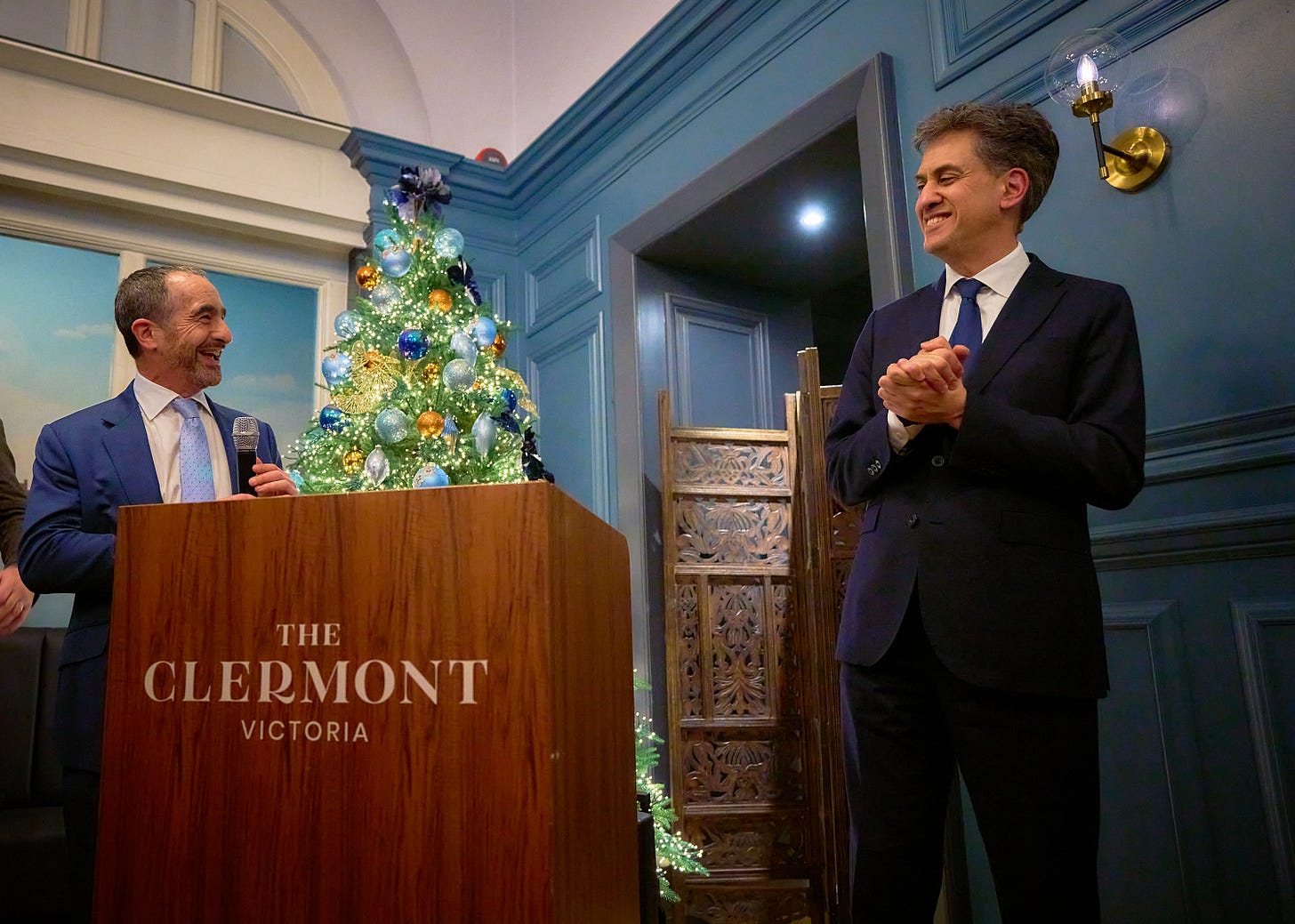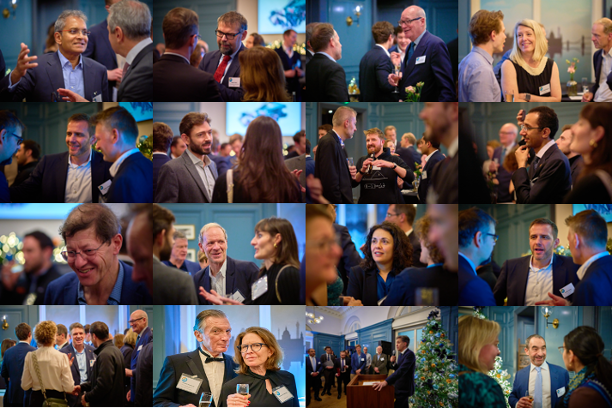
2024 - A Year to Remember
As I write this we are drawing to the end of 2024. And what a year!
On the geopolitical front we have lived through President Biden’s dramatic abdication and President Trump’s re-election; the end of 14 years of UK Conservative government; the collapse of the German and French governments; the rise of nationalist parties in European elections (thankfully not yet reflected in the make-up of the new European Commission); year three of Russia’s illegal and disastrous war on Ukraine; the continuation of Israel’s pitiless assault on Hamas in Gaza and the opening of a second front against Hezbollah in Lebanon; the dramatic fall of the Assad regime in Syria; huge crowds on the street in Georgia; the re-election of South Africa’s ANC and India’s Prime Minister Modi with much-reduced mandates. And this is by no means an exhaustive list.
In the climate and clean energy space, 2024 has been yet another year of record-breaking roll-out of renewable energy, batteries and electric vehicles. Talk of a slow-down in EV sales has been shown to be largely wishful thinking on the part of those who want to see them fail. The reality is that over half of new cars in China are BEVs of PHEVs, a quarter in Europe, and one in ten in the US.
With China now the top global exporter of cars — as well as of almost every other category of climate technology — it should be clear to all that Europe has offshored not just manufacturing but industrial leadership. The US’s ability to respond hangs by a thread called the Inflation Reduction Act, perhaps about to be snipped by the incoming Administration.
The year has seen an extraordinary acceleration of the frenzy over AI. I get it, the potential is huge, I use it quite a bit myself. I’ve written a piece for Bloomberg on AI and energy, which should be out this week, and I’m an advisor to start-up data centre developer TerraByte. But the arms race to secure power supplies in the next few years for GW-scale data centres has descended into farce, with ever-more implausible proposals involving uncertified SMR designs, nuclear fusion and space-based power stations. The correction might not hit next year, but hit it will.
At least 2024 will be seen as the year the #HydrogenSoufflé definitively started to deflate with almost-daily news stories of absurd projects abandoned, and the European Court of Auditors calling for a reality check. I’m sorry for the people who have lost money or ruined their careers, but the world needs to focus on stuff that is actually going to drive the next wave of decarbonisation.
Cleaning Update
One of my major projects for 2024 was the relaunch of Cleaning Up.
At the end of 2023 we lost our only sponsor and things looked bleak. I was forced to think about why it felt important to continue, and how to put it on a viable long-term footing.
What is unique about Cleaning Up is not the size of its audience but its influence - evidenced by the quality of guests and the number of senior decision-makers that listen or watch. If all I wanted was a bigger audience, I could churn out videos about the next alleged tech breakthrough, or dance around gurning on Tiktok. But what would be the point?
Instead, working with co-host Baroness Bryony Worthington and the team, we developed a business model around Cleaning Up’s unique ability to drive the debate on climate solutions. We pulled together a Leadership Circle of organisations committed to net zero; to reassure them about our professionalism and intellectual rigour, we wrote a set of editorial principles, and I invited my great friend James Cameron (the climate guy, not the Titanic guy) to chair a new Editorial Committee.
The following organisations became founder members of the Leadership Circle: Actis, Alcazar Energy, Ecopragma Capital, EDP, Eurelectric, Gilardini Foundation, KKR, National Grid, Octopus, Quadrature Climate Foundation, SDCL, Wärtsilä. I take this opportunity to thank them again. Over time, we will add a few more names, and by the end of next year our intention is to expand the orbit of Cleaning Up by adding a membership tier.
We also created an Alumni Network, for everyone who has ever been a guest on Cleaning Up. It’s an incredible climate solutions brains trust; the goal is to keep them involved in our activities, to continue to support them, and help them extend their networks.
It is early days, but I think we are building something important. There is a gap and we know how to fill it, by doing three things: creating a space for rigorous problem-solving; bringing together players focused on action; and using media to improve the level of public debate and to accelerate outcomes.
The relaunch is already paying off. Traffic is up by more than three times over this time last year. Overall, since its launch in July 2020, Cleaning Up has delivered 1.4 million downloads, and last week we passed through the 0.5 million milestone on YouTube. We are now averaging over 20,000 downloads per week, a run rate equivalent to 1 million downloads per year.
Our most popular episode so far was the Season 13 opener with Greg Jackson, CEO and Founder of Octopus and a member of the Leadership Circle, which has been downloaded around 50,000 times. Another Leadership Circle member, Jonathan Maxwell, founder of SDCL, is seventh in our all-time chart with nearly 20,000 downloads.
Cleaning Up events
We have also hosted our first events. We kicked off with a drinks party and dinner in New York during Climate Week in September. Last week, in London, we hosted the first meeting of our Editorial Council, followed by drinks for 100 (including around 30 members of the Alumni Network), and then a dinner for the Leadership Circle and a few of their guests.
The drinks were a particular highlight. Ed Miliband, UK Secretary of State for Energy Security and Net Zero, dropped in to say a few words. The UK’s bipartisan support for climate action - the envy of many other countries - is under stress as never before. It is no secret that Ed and I are cut from different political cloth, so I think it was a welcome signal to many present that we remain committed to the same goals, even though we may not agree on the mix of policies to get there.

Two giants of system thinking
I’m not going to go through all of this season’s Cleaning Up guests - you can find a list of them easily enough here or on your favourite podcast platform or on YouTube. However, I am going to draw your attention to the three episodes that closed Season 13.
First up, Episode 188 with James Cameron, international climate lawyer, social entrepreneur, chair of our new Editorial Council and self-styled ‘radical in a suit’.
James has been on the show before, Episode 23, talking mainly about trade. This time, James and I mulled over the underwhelming results of COP29 Baku and the future of the COP process. With incoming President Trump almost certain to pull the US out again, with the EU mired in its long stagnation and with war on its doorstep, and with China still the wrong side of peak emissions, business-as-usual does not feel like an option.
European leaders offering to invest hundreds of billions in their strategic competitors emerging economic superpowers reads like peak complacency to me. Listening back, I was amazed how patient James was with me. No one sees the need for an international legal and diplomatic process as clearly as James.
Second, Episode 189 with Greg de Temmerman, deputy CEO of Cleaning Up Leadership Circle member Quadrature Climate Foundation. Greg is a former plasma physicist and coordinating scientist at ITER, the huge fusion project in the south of France. Switching to philanthropy, he is using his keen grasp of system thinking to find the sensitive intervention points that allow a few billion dollars of philanthropic funding, dwarfed by the amounts available to governments and the capital markets, to have a decisive impact.
You will not find a more insightful thinker about the technical and societal challenges holding back climate action.
And to close Season 13, my now traditional end-of-year-guest on Cleaning Up, Lord Adair Turner. It’s always a pleasure to speak with Adair, or Lord Turner of Ecchinswell, to give him his full title.
He and I first met when we both worked at McKinsey & Co in London, where he was a Director and I was a minion. Adair went on to have a stellar career as a banker, Director General of the CBI, financial regulator, author and first chair of the UK’s Climate Change Committee, before becoming chair of the Energy Transitions Commission in 2016.
What I found particularly striking in this year’s conversation with Adair was the contrast between the optimism with which we both view the trends in a number of clean solutions - solar, batteries and EVs in particular - and the pessimism with which we view the politics and geopolitics of the next few years - which seems replete with wars, populism and macroeconomic challenges.
So that brings Cleaning Up’s year to an end, it has been a really extraordinary one, what with the relaunch, the tripling of traffic, the creation of our Leadership Circle, so many great guests, and above all such a great response from our growing audience.
I want to thank the team behind it - Jo Jagger, Oscar Boyd, Alex McInerney, Jamie Oliver (the video guy, not the chef), my co-host Baroness Bryony Worthington and chair of our new Editorial Committee James Cameron (the climate guy, not the Titanic guy).
We’ll be back on January 8, 2025. Until then.




